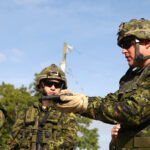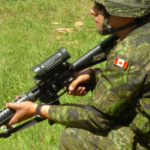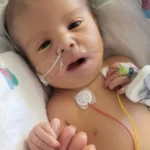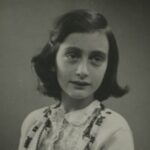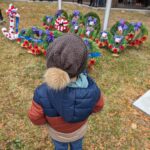Blog Post
The Queering of Veteran’s Day
By Jonathon Van Maren
Each November 11, my parents would take us downtown to watch the Remembrance Day parade. The solemn, shuffling veterans; the Last Post; the laying of the wreaths; the singing of hymns and the offering of prayers and benedictions in the crisp autumn air were an annual act of gratitude to the Canadian forces who liberated my family in the Netherlands all those years ago. One year, after the sounds of a Psalm gave way to the wind and leaves scratching across the sidewalk, my mother whispered to us: “They’ll never be able to take Christianity out of this day.”
I thought of that again this year in Tillsonburg, Ontario, where the crowd sang Martin Luther’s “A Mighty Fortress is Our God,” heard Scripture and the Warrior’s Prayer read aloud, and ended the ceremony with a benediction and “God Save the Queen.” (I noticed that during the National Anthem, nobody remembered to change “in all thy sons command” to “in all of us command”—I wonder if anyone sings the new version?) It was a testament to Canada’s Christian heritage and the sort of country she once was. The older ones sang along and bowed their heads; the younger ones were respectful as the ceremony proceeded. Everything seemed to prove my mother right.
So I was surprised to see First Things publish an article several days after Remembrance Day (Veteran’s Day in the U.S.) by Carl Trueman titled “Queering Veteran’s Day.” An excerpt:
Another week, another deathwork from a Catholic institution. This time it is Georgetown University. Last week, the university honored military servicemen and women by “queering” Veterans Day. Though the day traditionally commemorates those who have dedicated their lives—often at great, even ultimate, cost—to the service of their country, this event was a “celebration” of queerness. The immediate reason was the tenth anniversary of the repeal of “Don’t Ask, Don’t Tell” and the opening of the military to transgender people. According to the website of the Georgetown University Student Veterans Association, the ceremony involved reflection “on our Jesuit value of cura personalis, care for the whole person, and celebrate our queer sisters, brothers, and siblings.”
I wonder what the last veterans of World War II think of all this. The final veteran to run for president of the United States, Bob Dole, passed away this weekend at age 98. Colonel Edward Shames, the last surviving officer of the parachute infantry regiment known as “Easy Company” of Band of Brothers fame died Friday at the age of 99. Shames jumped into Normandy on D-Day, fought his way into Germany, and was the first member of the 101st Airborne to enter Dachau concentration camp. They truly were the Greatest Generation, and there are very few of them left. Only one Medal of Honor recipient from World War II, Woody Williams, is still with us.
The civilization these men fought for is very different from the one we inhabit now. At the cenotaph last month, there was only one World War II veteran present, who fought in the Netherlands and elsewhere. There was one other elderly man in attendance, a veteran of the Korean War. I’d like to ask them what they think of the nations that we have become, and whether they still recognize the country they knew when they are young and strong and fighting on the beaches and hedgerows and fields of Europe for nations that still identified as Christian.
Part of me thinks that our iconoclasts will never manage to cleave Christianity from ceremonies held in the shadows of cross-shaped cenotaphs and led by clergy. But my pessimism forces me to admit that the activists will surely come for this day, too. Nothing is sacred anymore, not even the sacrifices of our veterans.



